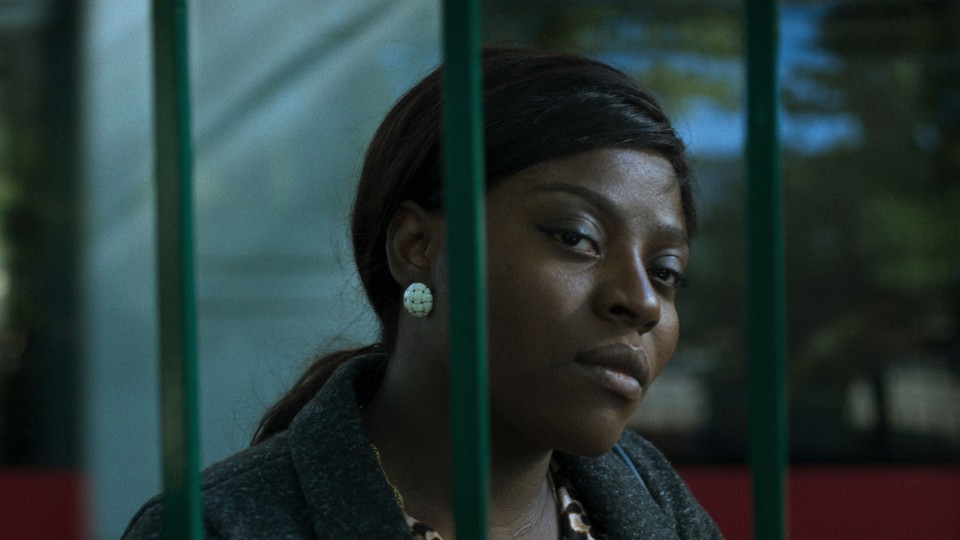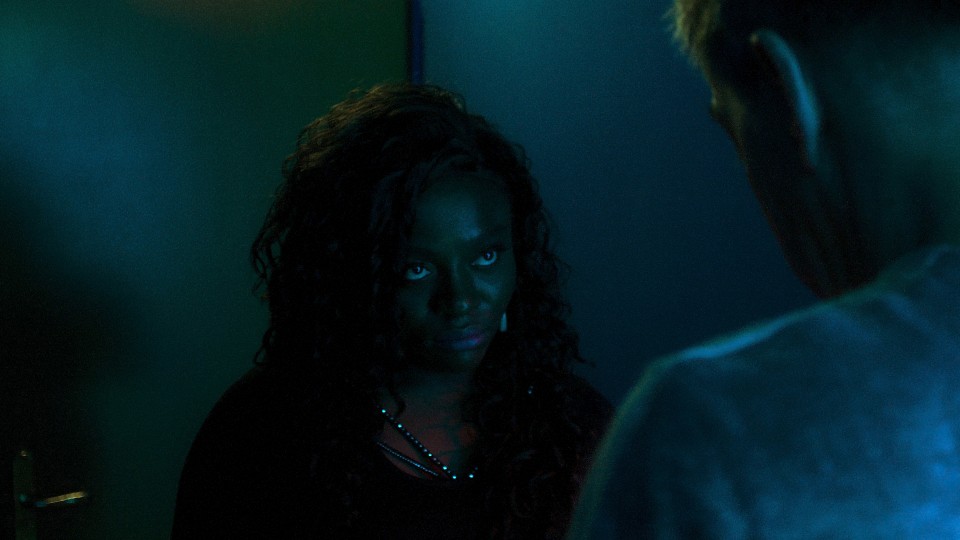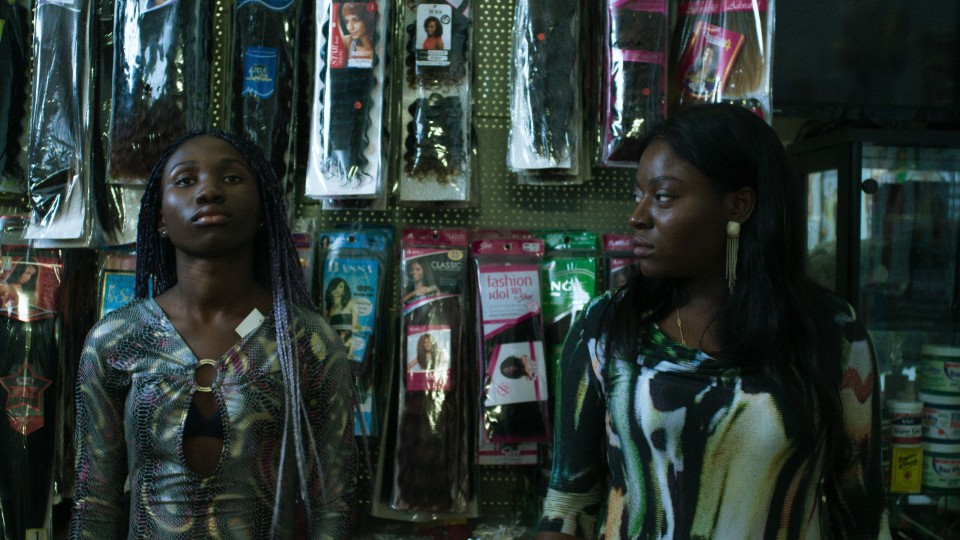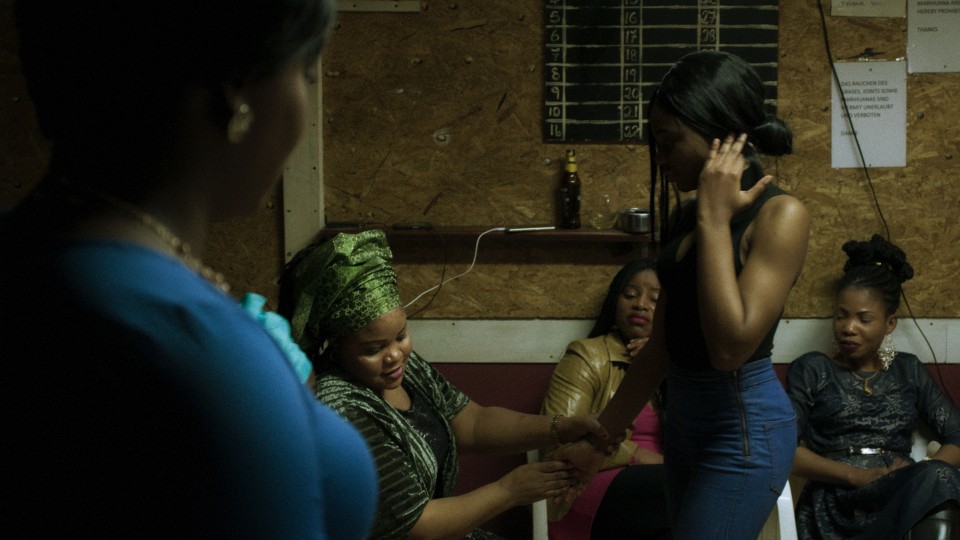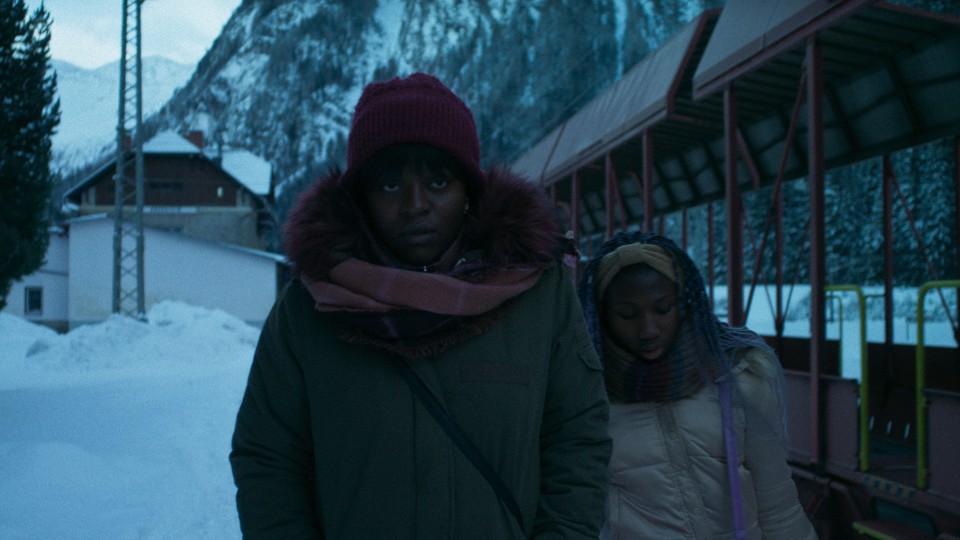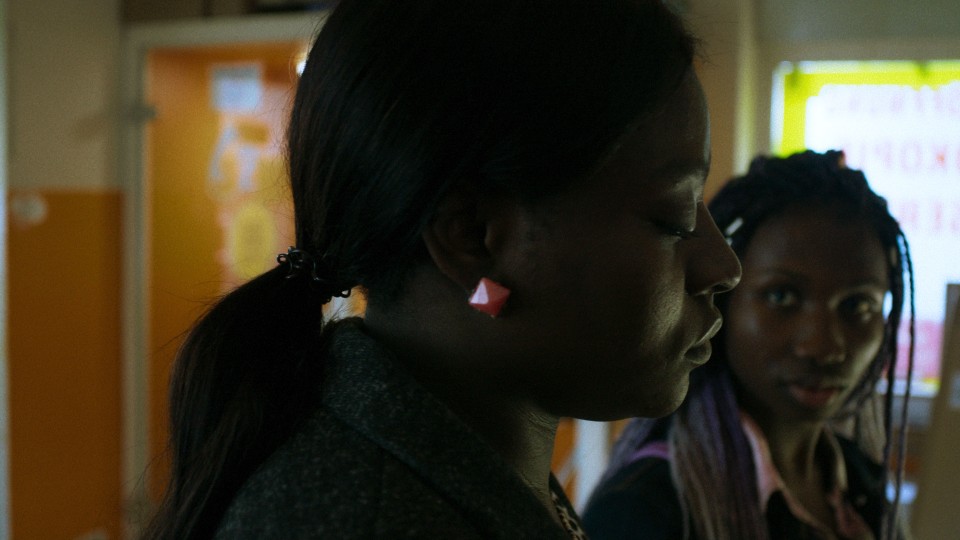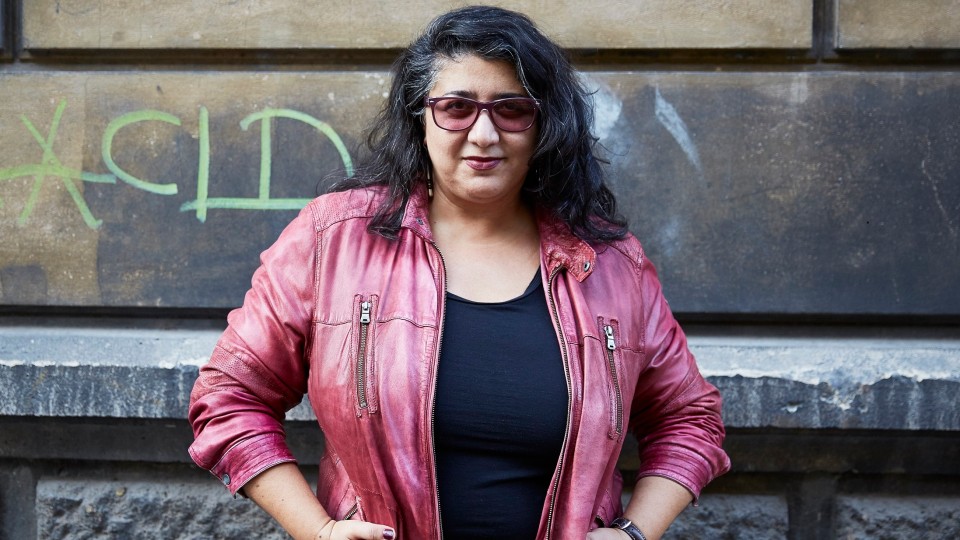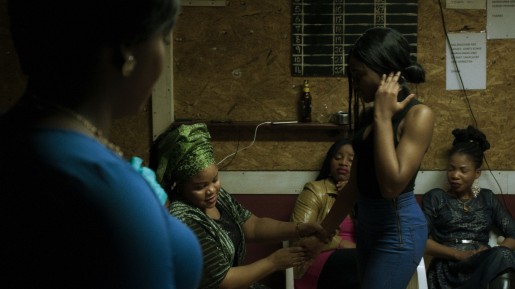You have chosen to set your second feature film, JOY, against the background of particularly perfidious human trafficking,
a system where women from Nigeria live in an endless loop of dependency and lack of solidarity. Could you briefly describe
the cycle women like your main protagonist Joy find themselves in?
SUDABEH MORTEZAI: It was the very perfidious nature of the system which attracted me to the subject. Whenever the subject of sex workers is
raised, an initial reflex is to ask: "Where are the men who are exploiting these women?" Naturally men, as clients or henchmen,
are always involved. But what if it is women who exploit the female sex workers – and what if these women have themselves
been sex workers? What shocked me (and interested me in particular as the theme for a film) was the fact that in the Nigerian
women trafficking system, the victims and the perpetrators are all women, all complicit. A system has been established whereby
women who themselves were victims of human trafficking, as soon as they have succeeded in paying off their "debts" of between
€50,000 and €60,000 as prostitutes, pursue one goal: to turn the tables and become "madams" themselves, getting girls who
have just arrived to work for them. The freedom they have purchased does not lead to any solidarity; it only provides them
with the opportunity to become women who profit from the system.
How was it possible for you to gain an overall impression of this system of sex work in Europe, and then to understand the
everyday life of these women? After all, your film is characterized by its extreme proximity to reality.
SUDABEH MORTEZAI: In the beginning it wasn’t easy to establish a point of contact. First I read about the subject, and then I tried to meet
women who were involved. Initially it was really difficult to conduct research in the red light district, until I realized
that the women were extremely afraid of getting into difficulties if they spoke to me. I then changed tactics and tried to
make contact with women who had escaped and were no longer immediately involved. Casting the film was my second step, and
it was really a continuation of the research. At that point a lot of women opened up and told me their stories. Like Macondo, JOY is based on extremely thorough research. It’s fictionalised in that the women do not enact their own stories but play
roles; however, they are very familiar with this world, partly from their own experience. To a certain extent they are co-authors
of the film, because the screenplay included a lot of their personal contributions.
The casting took place in Vienna. How willing were these women to take part in this kind of project? Did you encounter any
taboos due to their personal involvement?
SUDABEH MORTEZAI: I wanted to work in particular with women who had direct knowledge of the situation, from their own experience. And I resolved
not to say anything at all about the private lives of the women I worked with. The relationship they have with sex work is
not the same for all the women, and I very deliberately left that open. Our casting call was formulated in an extremely general
way. I then informed the people who came to auditions myself what the film would be about, and I was quite prepared for shocked
or indignant reactions. Surprisingly, that only happened in one instance. In every respect I encountered a great deal of openness,
which was a real gift. The only women who were not open were those who were still immediately involved in the working situation.
Which is quite understandable, because for them it was a safety risk.
How did you work with your non-professional actors to prepare them for their parts and in particular for the relationships
of the women to one another?
SUDABEH MORTEZAI: I'm absolutely convinced that for my mode of working, casting is the decisive step. If the casting is done well, the characters
fit together properly, and you place them in the right situations together, it automatically becomes interesting. I am confident
about that. There was a screenplay, a clear dramaturgy and scenes, but it was only during the improvisation that the film
really came into being. This time I wrote even less dialogue than for Macondo; instead I formulated a kind of declaration of intent showing which direction the scene should go in. I wanted to see for
myself where the scene would lead the actors. They did get instructions from me as a director, but I was always very open
to whatever they wanted to do with the scene.
There are two scenes featuring extreme male violence: at one point Precious is raped by the Madam’s henchmen, with all the
other women of the house present and nobody able to help her. The second time Joy is abducted by a client and subjected to
group rape. What were your thoughts about the subject of depicting violence?
SUDABEH MORTEZAI: The subjects of prostitution and sexualised violence naturally raised some very fundamental questions of what I wanted to
depict, and how. You have to be aware that there is always the danger of turning the women into objects even more by depicting
such things on film. Naturally what you show is a very tricky balancing act; I want the audience to appreciate how bad conditions
are while at the same time avoiding the women becoming victims yet again. I put a great deal of thought into this question,
and the two scenes you have mentioned are my answers. I structured the rape scene, where the audience is forced to be present,
in such a way that we as an audience are not there for the act of rape; we remain with the women who are witnesses and thus
become accomplices. I wanted the audience to experience along with these women what it's like to be trapped and forced into
a complicit relationship, without any power to intervene.
For this film did you once again shoot in chronological sequence and provide the actors with very little of the screenplay
in advance?
SUDABEH MORTEZAI: As a matter of principle I always work chronologically, although during the editing we did slightly change the position of
a few things, and I didn't give anybody a complete screenplay to read. I asked the actors to trust me and allow themselves
to be surprised by the way the story developed. I don't want people to know at the beginning of filming how their relationships
will progress, and how the film ends, because that way they construct the relationships themselves and inhabit their roles
even more. The women developed an incredible amount of details in the film themselves, and they defined for themselves the
relationships they would have to one another. I only had advance conversations with Precious and her family: at the time we
were shooting she was just 17, and for ethical reasons I had to communicate certain scenes to her clearly and tell her how
I planned to film them.
There is one long scene at a Sunday Mass in the Nigerian community in Vienna. To what extent are you attempting here to depict
something of the normality of these women's lives, to show that despite the work they perform, they are part of a community?
Or are you also playing with hypocrisy, suggesting that everybody is aware of these women's fate but acts as though nothing
untoward were happening?
SUDABEH MORTEZAI: I'm trying to do both things. Religion plays an important part in the lives of the Nigerian women; most of those I met, whatever
their social standing, would never miss Sunday Mass. It's a firm fixture in their everyday lives. Many of the women I dealt
with felt that the Christian religion helped them escape from the power of Juju, a kind of voodoo cult, by providing them
with a different spiritual force that gave them strength. Naturally I'm also interested in the hypocrisy here, because everybody
knows who the Madam is and who the exploited women are. Everyone knows each other: it's an open secret. I wanted to portray
this scene with its ambivalence, without making any comment. It was only during my travels around Nigeria that I came to appreciate
the impossibility of adopting moral standards unless you are in a reasonable social and economic situation. It's easy for
us in Europe, with our privileged position, to be indignant about a woman who is inflicting upon another woman the suffering
she herself has experienced. But that isn't due to a failure to comprehend good and evil; it's because there is no other way
out.
The film begins with a long sequence depicting a ritual which each of these young women has to submit to before setting off
from Nigeria to Europe. Why did you choose this introduction?
SUDABEH MORTEZAI: The Juju ritual is enormously important in this power structure as a mechanism of control over these women. Juju, also known
as voodoo, is extremely widespread in West Africa. There are a large number of shrines dedicated to various divinities. In
the context of human trafficking, it involves an oath being sworn which is the equivalent of a binding contract. The women
who are recruited in Nigeria have to swear they will pay off their debts and will never cooperate with the police. Small quantities
of blood, hair, fingernails, etc, are taken from them and stored in the shrine. The women fear that if they do not adhere
to this oath, they will die or become sick or insane, or members of their family could suffer. It is a crucial instrument
of power, and it has to be shown as such in the film. At the same time, I wanted the focus of the film to be in Europe. That's
why I use a kind of parentheses, with the beginning and the end of the film set in Nigeria, and the main action taking place
in Austria.
What status do these women have back home, if they decide to return to Nigeria after paying off their debts?
SUDABEH MORTEZAI: If they come back empty handed, they are despised by their families. It's extremely brutal. Everybody sticks their heads
in the sand and refuses to acknowledge what these women have been through. The main thing is that they send money home. A
representative of NAPTIP, the state organization in Nigeria that works to combat human trafficking, told us that the women
who are deported from Europe immediately try to get back there. The only real way they can return to Nigeria is if they bring
money. And if they manage to do that, the stigma of prostitution is no longer attached to them. Then they are able to marry
and have families. They are regarded as successful women. I made a conscious decision to tell the story of a woman who does
everything she possibly can to succeed within the system, only for this to mark the beginning of a downward spiral for her.
If we want to debate the subject on a different level, we would have to discuss why we in Europe live so well, and which people
have to suffer so that we can maintain our standard of living. Because everything is connected. The corrupt social systems
where women like those in my film exist, without any means of escape, have not come about in a vacuum. And we are not only
talking here about the history of colonialism but also the way exploitation of natural resources has proceeded ever since.
In the global system we would all like to have everything and consume whatever we want – but we don't want to know anything
about the people involved. Seen from this perspective, the fate of these people involves us all.
Interview: Karin Schiefer
August 2018
Translation: Charles Osborne

